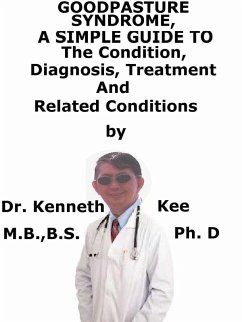Goodpasture syndrome is an infrequent and possibly life-threatening autoimmune disease.
Some forms of the disease affect just the lung or the kidney.
It produces accumulation of autoimmune proteins in the kidneys and lungs that causes damage of these organs.
Without proper diagnosis and treatment, the disorder can cause significant bleeding in the lungs, kidney inflammation and failure, and even death.
Causes
Goodpasture syndrome is a disorder of autoimmune cause.
It happens when the immune system incorrectly attacks and damages healthy body tissue.
People with this syndrome produce substances that assault a protein called collagen in the small air sacs in the lungs and the filtering units (glomeruli) of the kidneys.
These substances are called anti-glomerular basement membrane (Anti-GBM) antibodies.
The glomerular basement membrane is the part of the kidneys that helps filter waste and extra fluid from the blood.
Anti-glomerular basement membrane antibodies are antibodies attacking this membrane.
They can injure the basement membrane, which can cause kidney damage.
Occasionally, this disorder is activated by a viral respiratory infection or by breathing in hydrocarbon solvents.
In such cases, the immune system may attack organs or tissues because it incorrectly believes them for these viruses or foreign chemicals.
The immune system's faulty reaction causes bleeding in the air sacs of the lungs and inflammation in the kidney's filtering units.
Certain respiratory infections may activate the immune system.
Being exposed to hydrocarbon fumes, metallic dust, tobacco smoke, or certain drugs, such as cocaine, may also raise the risk.
Doctors thought the immune system attacks lung and kidney tissue because the body's defenses recognize parts of those organs as foreign to the body itself.
Certain people appear to be more vulnerable to this disorder due to genetics.
This involves people who have inherited specific proteins from their parents, present as part of the HLA (human leukocyte antigens) system.
Early symptoms may be:
1. Fatigue, weakness, or lethargy
2. Nausea or vomiting
3. Loss of appetite
4. Unhealthy, pale appearance
Lung symptoms may be:
1. Coughing up blood (hemoptysis)
2. Dry cough
3. Shortness of breath or difficulty breathing
Occasionally symptoms involving the lungs can become life-threatening, producing respiratory failure, mostly if there is a lot of bleeding.
Kidney and other symptoms are:
1.Bloody urine or foamy urine
2.Burning sensation during urination
3.Nausea and vomiting
4.Pale skin
5.Swelling (edema) in any area of the body, particularly in the legs
6.Elevated blood pressure readings
7.Back pain below the ribs
Diagnosis:
1.A blood test may reveal the evidence of antibodies (proteins produced by the immune system to fight whatever it is that has been identified as a risk) that suggest the presence of the disease.
It can also reveal abnormal kidney function.
2.Urinalysis results are often abnormal, and show blood and protein in the urine, indicating kidney diseases.
3.A chest X-ray or CT scan may reveal lung damage and bleeding in the lungs.
4.A kidney biopsy may show anomalies that indicate the presence of Goodpasture syndrome.
Treatment:
1.Plasmapheresis, which eliminates harmful antibodies to help decrease inflammation in the kidneys and lungs.
2.Immunosuppressive drugs prevent the immune system from making the antibodies that injure the lungs and kidneys
3.Corticosteroids reduce inflammation and suppress the immune system.
Dialysis or kidney transplant may be done if kidney failure can no longer be treated.
TABLE OF CONTENT
Introduction
Chapter 1 Goodpasture Syndrome
Chapter 2 Causes
Chapter ...
Dieser Download kann aus rechtlichen Gründen nur mit Rechnungsadresse in A, B, CY, CZ, D, DK, EW, E, FIN, F, GR, H, IRL, I, LT, L, LR, M, NL, PL, P, R, S, SLO, SK ausgeliefert werden.


